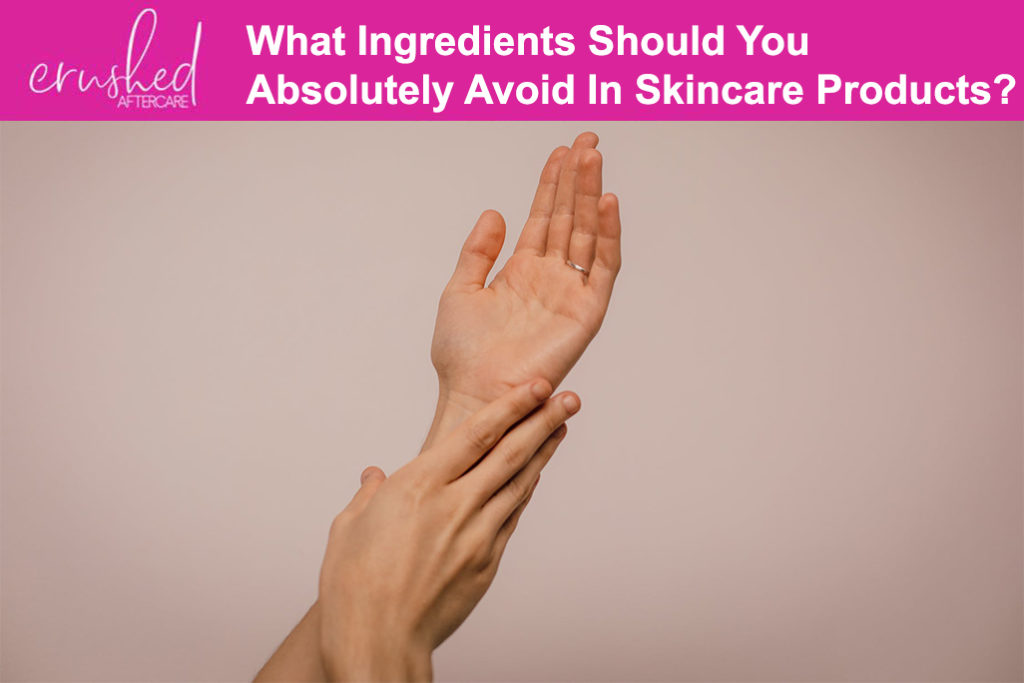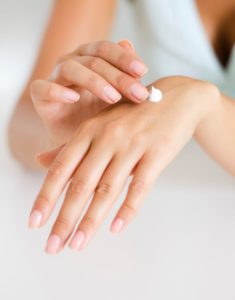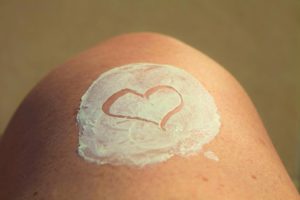
What Ingredients Should You Absolutely Avoid In Skincare Products?
Our company has made a point of using only safe, ethical ingredients, but not nearly enough companies have made the same commitments. Many continue to use synthetic chemicals and preservatives that have been known to harm the skin.
Self-regulation is the best way to ensure what people are putting on their skin – and ultimately what ends up in your body – is completely safe. Here’s what to look for on a list of ingredients in everyday skincare products so you can avoid them.
The Three “P’s”: Parabens, Phthalates, and Parfum
 The three biggest ingredients to avoid are parabens, phthalates, and artificial fragrances. These are the most common chemical ingredients found in conventional skincare products. The most common one is parabens, and these are preservatives that prevent bacteria from growing in the product. They are known to mimic estrogen in the body and disrupt the endocrine system, leading to hormonal imbalances. Over time this imbalance can be the cause of serious illnesses. Parabens are found in just about all conventional beauty products, from moisturizers to makeup to soap and shampoo, but they won’t always be listed as “parabens”; isobutylparaben, isopropylparaben, methylparaben and proplyparaben are the most common forms of this preservative. If you see “paraben” in any long, confusing word, avoid that product.
The three biggest ingredients to avoid are parabens, phthalates, and artificial fragrances. These are the most common chemical ingredients found in conventional skincare products. The most common one is parabens, and these are preservatives that prevent bacteria from growing in the product. They are known to mimic estrogen in the body and disrupt the endocrine system, leading to hormonal imbalances. Over time this imbalance can be the cause of serious illnesses. Parabens are found in just about all conventional beauty products, from moisturizers to makeup to soap and shampoo, but they won’t always be listed as “parabens”; isobutylparaben, isopropylparaben, methylparaben and proplyparaben are the most common forms of this preservative. If you see “paraben” in any long, confusing word, avoid that product.
Phthalates are chemicals added to plastic to keep it from becoming brittle, but they are also used to help skincare products adhere to the skin. They are also frequently found in fragrances (though you might not know it) and other personal care products like hairspray and nail polish. Like parabens, phthalates are endocrine disruptors and can cause hormonal imbalances, reproductive problems, and even birth defects. If you see initialisms like DBP, DEHP, or DEP, put the product back on the shelf.
 Last but not least, there’s parfum, and artificial fragrances are terrible for the skin. Almost all conventional skincare products on the shelves, even the ones labelled “unscented,” contain chemically-derived fragrances. But because manufacturers aren’t required to reveal the recipes of their fragrances, you’ll often see it listed with words like “fragrance” or “parfum.” These are most likely a mixture of allergens, endocrine disruptors, irritants, and even known carcinogens.
Last but not least, there’s parfum, and artificial fragrances are terrible for the skin. Almost all conventional skincare products on the shelves, even the ones labelled “unscented,” contain chemically-derived fragrances. But because manufacturers aren’t required to reveal the recipes of their fragrances, you’ll often see it listed with words like “fragrance” or “parfum.” These are most likely a mixture of allergens, endocrine disruptors, irritants, and even known carcinogens.
Other Common Chemical Ingredients
The three “Ps” are the most common offenders for skincare products, but there are many other chemicals that consumers should avoid:
- BHT: Butylated hydroxytoluene, or BHT, is a synthetic antioxidant used as a preservative like parabens. Also like parabens, BHT is a known hormone disruptor that could cause liver damage and is potentially carcinogenic.
- Formaldehyde: A surprisingly common ingredient for cosmetics, formaldehyde can also find its way into moisturizing body washes. It has been linked to asthma and neurotoxicity, so leave it in the biology lab where it belongs.
- Retinol: Touted by many companies as natural Vitamin A, Retinol is used as an anti-ageing ingredient to soften the look of wrinkles. However, it could speed the growth of skin tumours when used topically, and many doctors advise pregnant women against their use.
How Can You Find Alternatives To These Harmful Ingredients?
 Most companies know these cheap ingredients can cause harm over time, but still use them because it is legal to do so. The best way to remove these chemicals from shelves is by creating higher consumer demand for healthy alternatives. One way to point people in the right direction is through education. As more consumers read labels and choose not to use skincare products made with endocrine disruptors, allergens, and carcinogens, the better everyone will be.
Most companies know these cheap ingredients can cause harm over time, but still use them because it is legal to do so. The best way to remove these chemicals from shelves is by creating higher consumer demand for healthy alternatives. One way to point people in the right direction is through education. As more consumers read labels and choose not to use skincare products made with endocrine disruptors, allergens, and carcinogens, the better everyone will be.
Crushed Aftercare sells its all-natural and chemical-free balms wholesale to tattoo parlours, salons, and beauticians. By sending clients home with our products, these businesses can introduce people to the healing power of plant-based ingredients. They might start looking more closely at their moisturizers, lotions, and even hair care products and start choosing healthier alternatives!






